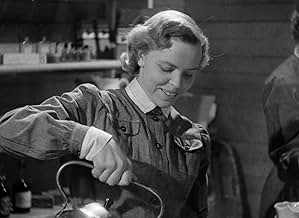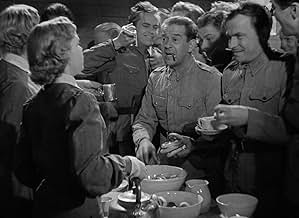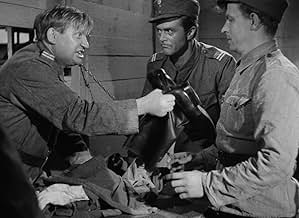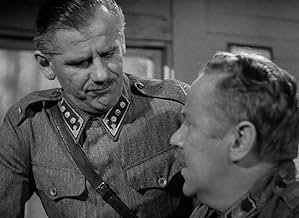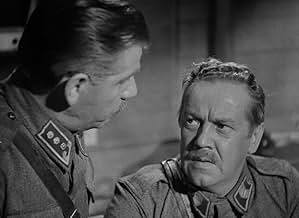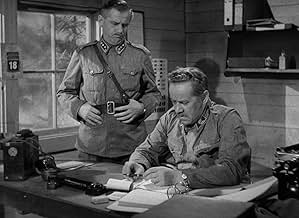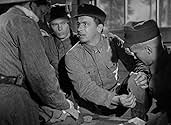Tuntematon sotilas
- 1955
- 2 घं 57 मि
IMDb रेटिंग
8.0/10
8 हज़ार
आपकी रेटिंग
अपनी भाषा में प्लॉट जोड़ेंThe tale of a platoon of soldiers during the Continuation War. Based on Väinö Linna's book of the same name.The tale of a platoon of soldiers during the Continuation War. Based on Väinö Linna's book of the same name.The tale of a platoon of soldiers during the Continuation War. Based on Väinö Linna's book of the same name.
- 1 BAFTA अवार्ड के लिए नामांकित
- 7 जीत और कुल 1 नामांकन
फ़ीचर्ड समीक्षाएं
Tuntematon sotilas (The Unknown Soldier), based on Väinö Linna's novel, is the most succeeded domestic movie in Finland. It's easy to understand how it has gained such a high position.
The direction of Edvin Laine shows all that is essential and transitions between scenes work because of authentic war film material. Music does its purpose and serves patriotic positive atmosphere, especially Jean Sibelius' Finlandia hymn is impressive. Some hilarious comments make smile besides of dark subject. Sound effects have however gotten old-fashioned, especially the voice of bouncing bullets from old westerns is extremely unrealistic.
There's lots of strong performances in Tuntematon sotilas, Heikki Savolainen's delighted Hietanen, Leo Riuttu's funny Vanhala and Jussi Jurkka's swaggering Lammio are only few examples. Although the actors are professionals and superstars of their time most of them are way too old to be their young role characters. Especially Olavi Ahonen's middle-aged timid Riitaoja didn't make positive impact. Also some of the actors die too theatrically.
The script of the movie is good but it presumes too much that all of the viewers have read the novel. For example most of the characters names are not mentioned at all or are only mentioned in the near of the end of their lives. Mostly the only way for those who haven't read the novel to recognize the characters is to recognize the actors who are playing them. Also some aspects of the book witch emphasize the Continiuty War's violent and absurd points, like insane Viirilä, are completely left off, which little dims the novel's strong antiwar message. The only significant error in Tuntematon sotilas is that it's too much a prisoner of its time.
In any case, Tuntematon sotilas is still worth of watching because of it's impressive narration, atmosphere and characters, even though the movie doesn't feel as fresh as 52 years ago.
The direction of Edvin Laine shows all that is essential and transitions between scenes work because of authentic war film material. Music does its purpose and serves patriotic positive atmosphere, especially Jean Sibelius' Finlandia hymn is impressive. Some hilarious comments make smile besides of dark subject. Sound effects have however gotten old-fashioned, especially the voice of bouncing bullets from old westerns is extremely unrealistic.
There's lots of strong performances in Tuntematon sotilas, Heikki Savolainen's delighted Hietanen, Leo Riuttu's funny Vanhala and Jussi Jurkka's swaggering Lammio are only few examples. Although the actors are professionals and superstars of their time most of them are way too old to be their young role characters. Especially Olavi Ahonen's middle-aged timid Riitaoja didn't make positive impact. Also some of the actors die too theatrically.
The script of the movie is good but it presumes too much that all of the viewers have read the novel. For example most of the characters names are not mentioned at all or are only mentioned in the near of the end of their lives. Mostly the only way for those who haven't read the novel to recognize the characters is to recognize the actors who are playing them. Also some aspects of the book witch emphasize the Continiuty War's violent and absurd points, like insane Viirilä, are completely left off, which little dims the novel's strong antiwar message. The only significant error in Tuntematon sotilas is that it's too much a prisoner of its time.
In any case, Tuntematon sotilas is still worth of watching because of it's impressive narration, atmosphere and characters, even though the movie doesn't feel as fresh as 52 years ago.
The movie is based on a brilliant and realistic book (Unknown soldier) about the "Continuation War" between Finland and Soviet Union from 1941 to 1944.
After the initial fast attack phase the war turns into sleepy trench warfare (1942-44), then (1944)the company has to retreat and finally stop the storming Red Army forces. There exists a wide spectrum of characters from cowards to heroes, from peasant rank-and-file soldiers to cocky officers. The scale in personalities and changing situations of war, which are credibly described, makes the movie a spectacle.
It helps a lot if one knows some of the underlying history, but the story is rather universal tale of the cruelty of war and the men who have to live and die for their country and different motives. The language with dialects is versatile, but in Finnish only. This old version (1955) is in my opinion better than the later one (1985).
After the initial fast attack phase the war turns into sleepy trench warfare (1942-44), then (1944)the company has to retreat and finally stop the storming Red Army forces. There exists a wide spectrum of characters from cowards to heroes, from peasant rank-and-file soldiers to cocky officers. The scale in personalities and changing situations of war, which are credibly described, makes the movie a spectacle.
It helps a lot if one knows some of the underlying history, but the story is rather universal tale of the cruelty of war and the men who have to live and die for their country and different motives. The language with dialects is versatile, but in Finnish only. This old version (1955) is in my opinion better than the later one (1985).
Tuntematon sotilas (The Unknown Soldier) is an epic story and part of Finland's history. The movie is based on famous Finnish novel by Väinö Linna, and it is set in the Continuation War (1941-44), just about a year after the Winter War, between Finland and Soviet Union. The movie is fully black and white.
The Unknown Soldier focuses on a very diverse group of soldiers and is packed with black humour. The different Finnish dialects, that make a huge part of the fun in the jokes, are understandable only for people who know Finnish, but the overall feeling is there in the amazing acting by Reino Tolvanen (Rokka), Kosti Klemelä (Koskela) and Pentti Siimes (Määttä) - to name a few. The most powerful scene is probably the one where Lehto, Määttä and Rahikainen are stubbornly serving their disciplinary duty after refusing to obey their superiors - directly under the enemy aerial fire.
The Unknown Soldier is one of the most realistic war movies ever made. It shows the horrible facts: people die for their home land and it's not pretty. The Finnish soldiers fight against the tenfold enemy in impossible situations. They made heroic acts in their attempt to save their country, and many of these acts have been captured brilliantly in the movie as well. But the true fact of war - death - is always around, even among the war heroes. War does not make one great.
The teaching of The Unknown Soldier is that even a small country has a chance in war against an impossible enemy if the will to protect the homeland is strong enough, the people are stubborn enough and are ready to die for freedom.
The main music in the film - Jean Sibelius' Finlandia is legendary.
The Unknown Soldier focuses on a very diverse group of soldiers and is packed with black humour. The different Finnish dialects, that make a huge part of the fun in the jokes, are understandable only for people who know Finnish, but the overall feeling is there in the amazing acting by Reino Tolvanen (Rokka), Kosti Klemelä (Koskela) and Pentti Siimes (Määttä) - to name a few. The most powerful scene is probably the one where Lehto, Määttä and Rahikainen are stubbornly serving their disciplinary duty after refusing to obey their superiors - directly under the enemy aerial fire.
The Unknown Soldier is one of the most realistic war movies ever made. It shows the horrible facts: people die for their home land and it's not pretty. The Finnish soldiers fight against the tenfold enemy in impossible situations. They made heroic acts in their attempt to save their country, and many of these acts have been captured brilliantly in the movie as well. But the true fact of war - death - is always around, even among the war heroes. War does not make one great.
The teaching of The Unknown Soldier is that even a small country has a chance in war against an impossible enemy if the will to protect the homeland is strong enough, the people are stubborn enough and are ready to die for freedom.
The main music in the film - Jean Sibelius' Finlandia is legendary.
10thomsohl
Being a swede myself and reading politi kasses interpretation of this movie as soviet propaganda makes me embarrassed. Of course it isn't! Probably he has never seen a soviet propaganda movie? Talking about propaganda I would say "Band of Brothers" contains more American propaganda than this movie contains soviet propaganda - even though Band of Brothers is a fantastic creation. I always find it refreshing to see war movies from other countries than USA. Often the consequences and moral issues of war are more much more interesting. Almost everyone in Europe knows somebody who fought in the war or suffered the consequences. Europeans saw their continent blow into pieces. Thats why we love anti-heroic movies like Das Boot and Stalingrad - and this one. By the way, how often do you see Finnish soldiers in movies? 10 out of 10.
The Unknown Soldier is really more than just a movie. It is a monument. The two wars between Finland and Soviet is so deeply rooted in the mythology of the Finnish country that it would be utterly pointless to limit yourself to the pure cinematic qualities, if you were to appreciate this film. The film really embodies a cinematic continuation of a big statue honoring the soldiers that fought and died in these battles, carved in stone to stand forever. To this day, this is still the most successful Finnish film ever made, and Finnish TV has been airing it every Independence day for over a decade. And that is only the movie, which despite all it's values is most important as an appendix to Väinö Linnä's classic novel of the same name. The 1954 novel is truly a masterpiece of realistic fiction, and the film is really just following it's trails. It is a fine war epic, but all it's virtues stem from the original novel. That is why I'm making a point of how to approach this film. This isn't just a story about the war, this is a film about a country, being important in itself, depicting a unique piece of Finnish history exclusive for Finland.
That being said, the big thing that the film brings onto the viewer is it's big heart. This is an epic in the most classic of fashions, presenting a kind of sentimental warmth and heartbreaking honesty that only cinema can create. The psychological reality of the novel is apparent in it's narrative, using no main characters but various ones, all diverse, realistic and totally present. Film is a medium that can't really enter the human mind with such piercing accuracy, thus the film takes use of some astonishing actors letting them hammer out their characters with spellbinding presence. To say that the film is character driven isn't really accurate, it's character BASED. When we meet our first batch of characters, we expect their happy smiles to be turned into war torn frowns. But the jokers of the group insist on keeping the mood as good as possible, no matter what fate may fall upon them. One of them, the cheerful Koskela (Kosti Klemälä) even ends up becoming Sergeant after a death-defying attack on a tank, but it's no big deal as long as they don't call him 'Sir'. Other characters are more serious minded, like Rokka (Reino Tolvanen), a man twice the age of most of the other soldiers, who's got wife and children at home. He is humorous and lovable, yet fearless and completely consequent in his role as a fighter, and he has only contempt for his so-called duty of discipline. He is the best soldier in the group, we learn, yet the biggest problem for the higher ranks who disapprove of his ways. Tolvanen is furious in the role, almost resembling a Finnish Toshiro Mifune, becoming the unified center of the soldier's morality.
These are just two examples of many characters that come and go during the film. I feel I have to mention the great Åke Lindman who portrays Lehto, a nihilist killing machine who seems to have leather skin and a heart of stone. As a dark version of Clint Eastwood he will never laugh, never cry, and he will defy death until the day it gets the better of him. Yet, as stereotypical as these characters may seem, you are never quite sure if they really are as happy, brave, cowardly or honest as they seem - indeed, in Linna's original version of the novel, Lehto was portrayed as a suicidal psychopath.
Running for three hours without a traditional plot narrative, The Unknown Soldier is filled with memorable sequences worthy that of a proper epic. One short scene involves three soldiers exchanging words with two Russian women, ending up with a wild Kalinka dance. In another sequence, all the soldiers get drunk and have a party when they should be on guard for enemies and, as it happens, they are lucky enough not to get ambushed by any russians. In one scene the soldiers witness an execution to warn them about the dangers of disobedience. In another, three soldiers punished with two hours of standing guard hold their stand despite bomb planes are hovering above them, attacking the camp.
These are basically war stories, anecdotes strung together and you get the feeling the film might as well keep telling them for another three hours, because the well doesn't dry up. These stories are the body of the Finnish war history, and for every soldier who fought in the war there's bound to be hundreds. These are as good as any, and it is when you consider the weight of this event that it becomes clear just what a monument the film is. The music seals the legacy - Jean Sibelius' opus for the epic, Finlandia.
That being said, the big thing that the film brings onto the viewer is it's big heart. This is an epic in the most classic of fashions, presenting a kind of sentimental warmth and heartbreaking honesty that only cinema can create. The psychological reality of the novel is apparent in it's narrative, using no main characters but various ones, all diverse, realistic and totally present. Film is a medium that can't really enter the human mind with such piercing accuracy, thus the film takes use of some astonishing actors letting them hammer out their characters with spellbinding presence. To say that the film is character driven isn't really accurate, it's character BASED. When we meet our first batch of characters, we expect their happy smiles to be turned into war torn frowns. But the jokers of the group insist on keeping the mood as good as possible, no matter what fate may fall upon them. One of them, the cheerful Koskela (Kosti Klemälä) even ends up becoming Sergeant after a death-defying attack on a tank, but it's no big deal as long as they don't call him 'Sir'. Other characters are more serious minded, like Rokka (Reino Tolvanen), a man twice the age of most of the other soldiers, who's got wife and children at home. He is humorous and lovable, yet fearless and completely consequent in his role as a fighter, and he has only contempt for his so-called duty of discipline. He is the best soldier in the group, we learn, yet the biggest problem for the higher ranks who disapprove of his ways. Tolvanen is furious in the role, almost resembling a Finnish Toshiro Mifune, becoming the unified center of the soldier's morality.
These are just two examples of many characters that come and go during the film. I feel I have to mention the great Åke Lindman who portrays Lehto, a nihilist killing machine who seems to have leather skin and a heart of stone. As a dark version of Clint Eastwood he will never laugh, never cry, and he will defy death until the day it gets the better of him. Yet, as stereotypical as these characters may seem, you are never quite sure if they really are as happy, brave, cowardly or honest as they seem - indeed, in Linna's original version of the novel, Lehto was portrayed as a suicidal psychopath.
Running for three hours without a traditional plot narrative, The Unknown Soldier is filled with memorable sequences worthy that of a proper epic. One short scene involves three soldiers exchanging words with two Russian women, ending up with a wild Kalinka dance. In another sequence, all the soldiers get drunk and have a party when they should be on guard for enemies and, as it happens, they are lucky enough not to get ambushed by any russians. In one scene the soldiers witness an execution to warn them about the dangers of disobedience. In another, three soldiers punished with two hours of standing guard hold their stand despite bomb planes are hovering above them, attacking the camp.
These are basically war stories, anecdotes strung together and you get the feeling the film might as well keep telling them for another three hours, because the well doesn't dry up. These stories are the body of the Finnish war history, and for every soldier who fought in the war there's bound to be hundreds. These are as good as any, and it is when you consider the weight of this event that it becomes clear just what a monument the film is. The music seals the legacy - Jean Sibelius' opus for the epic, Finlandia.
क्या आपको पता है
- ट्रिवियाThe film has been traditionally shown on TV in Finland every year on Independence Day (December 6) since the year 2000.
- कनेक्शनEdited into Juoksuhaudantie (2004)
- साउंडट्रैकFinlandia
by Jean Sibelius
टॉप पसंद
रेटिंग देने के लिए साइन-इन करें और वैयक्तिकृत सुझावों के लिए वॉचलिस्ट करें
- How long is The Unknown Soldier?Alexa द्वारा संचालित
विवरण
बॉक्स ऑफ़िस
- बजट
- FIM 4,66,67,761(अनुमानित)
- चलने की अवधि2 घंटे 57 मिनट
- रंग
- पक्ष अनुपात
- 1.37 : 1
इस पेज में योगदान दें
किसी बदलाव का सुझाव दें या अनुपलब्ध कॉन्टेंट जोड़ें

